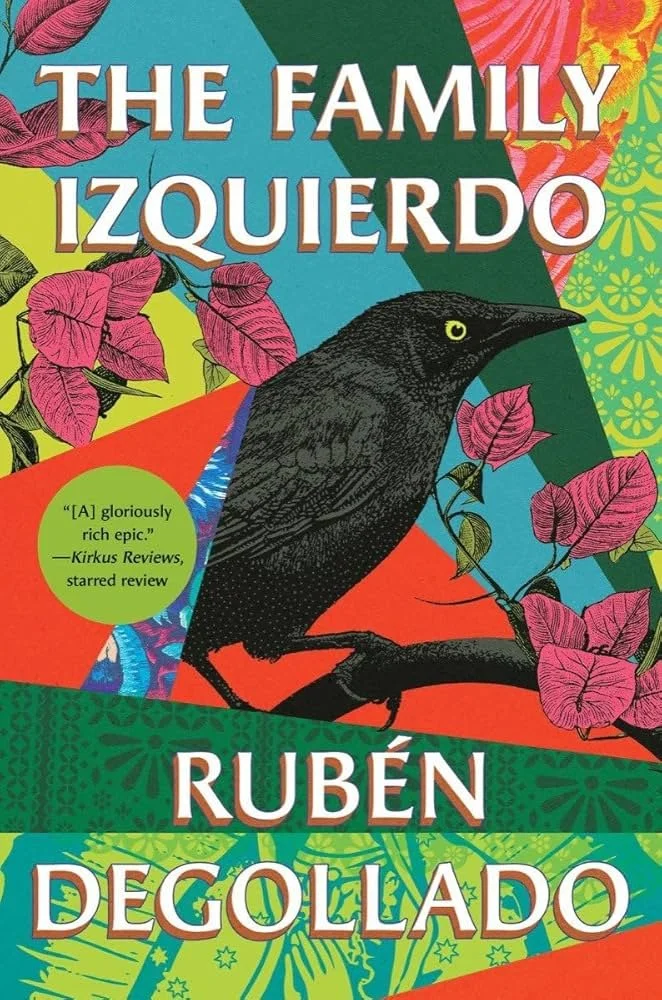Review of The Family Izquierdo by Elisa Gutierrez
Rubén Degollado is an educator from Texas and the author of The Family Izquierdo: A Novel and the young adult novel Throw. His fiction has appeared in Beloit Fiction Journal, Gulf Coast, Hayden’s Ferry Review, and Image. rubendegollado.com
The Family Izquierdo (W. W. Norton & Company) is available for purchase here.
Rubén Degollado's The Family Izquierdo is a lively confessional of the trials, trepidations, and treasures of a Tejano family living in McAllen, Texas. Everything begins and ends with their patriarch, Octavio "Papa Tavo" Izquierdo. His presence looms large from the first brick laid for their home after crossing the border from Mexico to a family curse laid by the Brujo Contreras. Even as the burden of taking care of ten children is lifted from his shoulders, Papa Tavo is overcome by grief and anxiety, unable to let go of his worries for his children."We follow the Izquierdo family as they transform over the course of the novel, which introduces ten children and fifteen grandchildren who create a collection of stories in six parts, introducing ten children and fifteen grandchildren along the way as they create futures for themselves while remembering where they came from. The Family Izquierdo is a powerful exploration of what it means to bear the family's legacy, whether good, bad, or otherworldly. Degollado asks, "What do we bury, and what do we burn?"
From the beginning, the Izquierdo family is brimming with love and loyalty. Family dinners and quinceaneras are bustling, especially centered around the Izquierdo children. Papa Tavo sacrificed everything, venturing into a new world and creating the strongest possible foundation for their success. Over ice cream and carne asada, he regularly encourages his children to venture as far as they can and "give it ganas." A mistake by the oldest son, Gonzalo, leads the Izquierdo family into danger when a local brujo curses them, infecting the bloodline with bad luck and susto. Fortunately, the Izquierdos are magical, empowered by a strong bloodline and belief in themselves. One granddaughter seeking the reunification of her family through sanctification and holy offerings finds a miracle during an Easter barbeque in the form of a tortilla. The oldest grandson, Cirilo, protects his family from the susto, encouraging his younger cousins and diffusing tension between his tías and tíos. The true cost of being an Izquierdo reveals itself in these quiet moments, where love and fear intertwine. Taking on the weight of tradition and the burden of magic, the Izquierdo children must decide what that means for their futures. Degollado does the same, dispersing hopeful and magical scenes when the family situation seems dire.
Degollado's writing gives the reader a seat at the table, smelling the sizzling steak and listening to the divine hymn of laughter while night air presses into your skin. The canonization of Selena Quintanilla, holy hair washes, and the ending of a curandero's curse on the family could be told over a cup of coffee, with onomatopoeia like "Zas!" and sarcastic comments about another family's feote kids that resonate with nosy tías everywhere. There is no shortage of entertaining anecdotes, but the strongest writing in The Family Izquierdo is shown in the painful, quiet moments. As the Izquierdos grapple with the weight of bearing the family name and the curses that come with it, the reader gains insight into what it means to be an Izquierdo. The eldest child, Gonzalo, struggles with becoming the head of the family while Papa Tavo's health rapidly deteriorates, leading to tensions with his wife. An emotional outburst to demonstrate his mental strength, though vain, leads to his sudden exit from their home, as one chapter reflects:
"And now, instead of apologizing for your tone, which would have been the right thing to do, you walked out of the room, hoping to leave your volume and the shameful memory, even though it was always before you and not behind you."
This chapter stands out as the only one written in the second person, immersing the reader in Gonzalo's thoughts and emotions during a particularly tense moment. This perspective draws you into his mind, allowing you to experience the amplified anxiety and urgency as the events unfold around him. In the final moments, the last line of the story ties everything together in a voice that seems like an invisible being yet still feels like part of the family:
"... the words they spoke came out of that barrio in our Izquierdo hearts where letting go and relief and hope are all the same thing."
As the family Izquierdo determines what their future looks like, we can be sure that it will be filled with warmth, food, and the memories of their ancestors. Degollado invites us to sit with the Izquierdos, to eat, drink, and pray with them. With captivating blends of humor and sorrow, of reality and mysticism, The Family Izquierdo leaves the reader with a powerful question—What does it mean to be a part of a family, and how far are we willing to go to embrace both its curses and its gifts?
Elisa Gutierrez is a former Haydens Ferry Review intern and a current undergraduate student at Arizona State University
